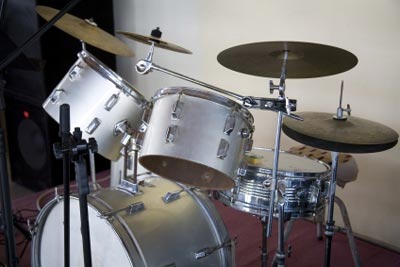(单词翻译:单击)
情景对话
Todd: So Tres, you are a drummer.
托德:特雷斯,你是名鼓手。
Tres: Yes, I am indeed. And for all that negative baggage that comes with that term, yes I am a drummer.
特雷斯:对,我是鼓手。虽然好多人对鼓手有负面的看法,不过我确实是名鼓手。
Todd: Wait wait, so you say that there's negative terms that go with being a drummer?
托德:等等,你说鼓手总会得到负面的评价?
Tres: Well sometimes when people hear "oh they're a musician" you know, "oh you better watch out for them". Yeah, it's true.
特雷斯:有时你会听到人们说“哦,他们是玩音乐的”,你知道,意思是“哦,你最好小心点他们。”现实就是这样。
Todd: OK. Well, what kind of drums do you play?
托德:好,你打的是哪种鼓?
Tres: I grew up playing in punk bands, mostly because those were the only bands scouting for drummers at the time. However, what I enjoy playing is funk, jazz, blues and salsa, specifically Cuban salsa.
特雷斯:我青年时代是在朋克乐队里演奏鼓的,大部分原因是朋友乐队是当时唯一需要鼓手的乐队。不过,我喜欢演奏放克音乐、爵士乐、蓝调乐和萨尔萨乐,尤其喜欢古巴萨尔萨乐。
Todd: OK. Now, so for the different types of music that you play, do you always use the drum sticks, or do you sometimes just use your hands?
托德:好,这么多不同种类的音乐类型,你在演奏时是用鼓槌,还是有时就用手来演奏鼓?
Tres: When I play on a drum set, I either use drum sticks or a bundle of sticks that are really small called hot rods, or brushes. Usually if I'm doing a jazz piece or a very soft acoustic set, I'll use brushes. If I'm using other percussion instruments, for example a jimbei, then of course I use my hands.
特雷斯:我在打架子鼓时,我会用鼓槌或是一种小的束棒。如果我要演奏爵士乐或非常柔和的不插电音乐,那我就会用束棒。如果我要演奏jimbei这样的其他打击乐器,那我当然就会用我的手了。
Todd: What's a jimbei?
托德:jimbei是什么?
Tres: Jimbei is a large drum that comes from West Africa. And you play with your hands using various African poly-rhythms. And lately, a lot of Western drummers have picked up the drum, and have fused Western rhythms along with African and Latin poly-rhythms. So it's a very fun, but very difficult instrument to play.
特雷斯:是一种来自于西非的大鼓。你要用手来打鼓,而且会使用到不同的非洲复合节奏。最近有很多西方鼓手开始演奏这种鼓,他们将西方节奏和非洲及拉丁的复合节奏结合起来。所以演奏这种乐器很有趣,不过也很难。
Todd: What do you prefer, using the sticks, or the hot rods or using your hands.
托德:你更喜欢哪种,是用鼓槌,还是用你的手?
Tres: Again it depends on the music that I'm playing. I enjoy playing in general. My preference would be playing the drum set with the sticks, just because I really love the more rocky-fusion-type-jazz, the more avant guard type stuff. And I also like salsa, which usually, you know you have your clave, which is a little wooden-like block. And your cowbell, and you also have timbales, which are two drums that you hit on. Sorry for the bad description.
特雷斯:我要再说一次,这取决于我演奏的音乐类型。我喜欢打鼓。我喜欢用鼓槌打架子鼓,因为我更喜欢摇滚乐与爵士乐混合而成的音乐,那种更先锋的音乐。同样我也喜欢萨尔萨,你知道要用响棒,这是一种木制的打击乐器。还有牛铃,还有两个鼓连在一起的天巴鼓。抱歉我形容的不好。
Todd: That's OK. When you're playing the drums, do you ever lose a drum stick?
托德:不会。你打鼓的时候曾经有把鼓槌弄丢过吗?
Tres: I have in the past, yeah. Those question you're asking are very very embarrassing for a drummer to nswer. But yes, sometimes I've thrown them into the audience, usually on purpose. But occasionally, a drummer will lose a drum stick. So you usually have a pouch that you'll put either next to your hi-hat, which are two symbols that you open and close with your foot, or next to a fore tom which is the large drum that sits on the ground. So you have extra sticks that you can grab when you need them.
特雷斯:以前有过。实际上你这些问题对鼓手来说非常非常尴尬。有时我会把鼓槌扔给观众,通常是有意为之。不过有时候鼓手也会不小心弄丢鼓槌。所以你要准备个小袋子,放在踩镲架旁边,你在开始和结束时会用脚踩镲发出信号,或者放在立在地上的大鼓旁边。这样你在需要的时候就可以拿到备用的鼓槌了。
Todd: Sounds cool.
托德:听起来真酷。
Tres: Very cool.
特雷斯:非常酷。

译文属可可原创,仅供学习交流使用,未经许可请勿转载
重点讲解
重点讲解:
1. watch out
小心,提防(不愉快的事情或陷入困境);
eg. I advised them to watch out for slick spots on the sidewalk.
我叫他们当心人行道上路滑的地方。
eg. You have to watch out for insincere people.
你得小心那些虚情假意的人。
2. scout for
(在某地)搜索,寻找;
eg. A team of four was sent to scout for a nuclear test site.
一个4人小分队被派出寻找核试验地。
eg. Go and scout for firewood for the picnic.
去找些柴来做野餐。
3. on purpose
特意地;故意地;有意地;
eg. He explained that he have not do it on purpose.
他解释他不是故意做这件事的。
eg. I don't think he stepped on your toes on purpose.
我想他不是有意伤害你的感情。


